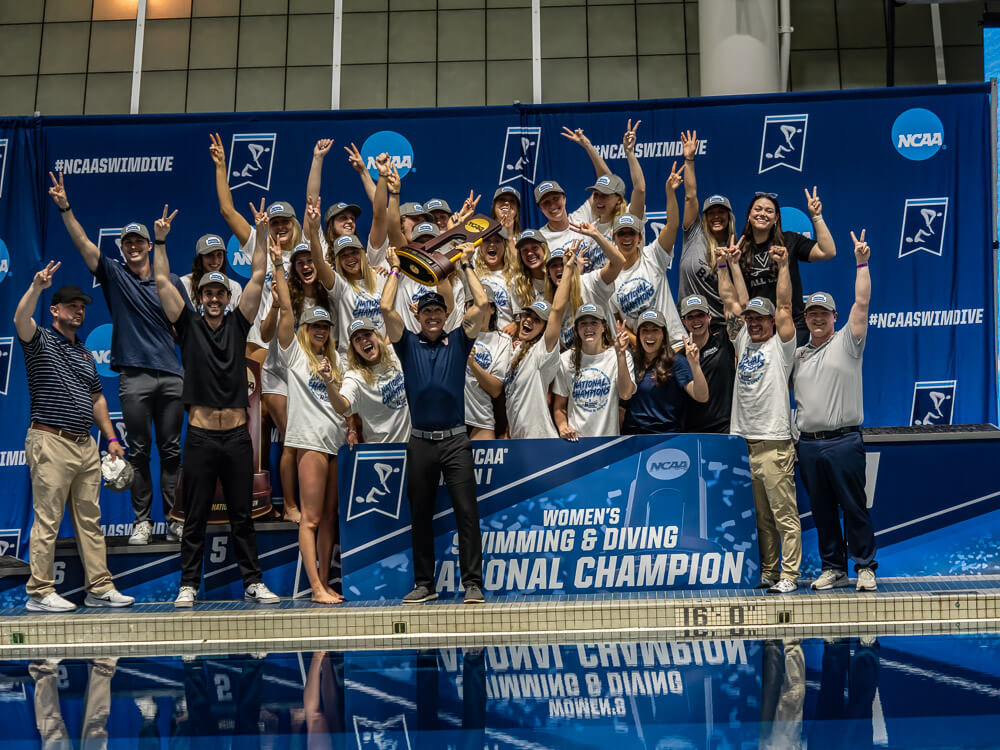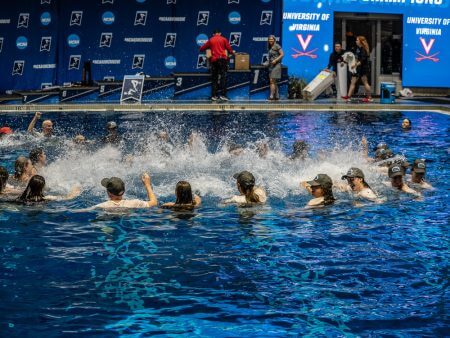Virginia Women Clinch ‘Hard to Digest’ Fourth Consecutive National Title, Aiming to ‘Keep it Going’

Virginia Women Clinch ‘Hard to Digest’ Fourth Consecutive National Title, Aiming to ‘Keep it Going’
Greatness. Records. Titles. Dynasty. All of those terms tell the story of the University of Virginia women’s swim team, which secured its spot among the elite programs in the sport’s history Saturday evening by securing the NCAA team championship for the fourth year in a row.
“I’m not sure I can put it into words,” Virginia head coach Todd DeSorbo said. “It’s really hard to digest even one. I told the girls before the session that there are only nine teams that have ever won one national championship, and we’re one of nine. When you have 70 teams at a national championship, that’s pretty impressive in and of itself. It’s just wild.”
Entering this season, the Cavaliers lost important members of their program, including seven-time individual NCAA champion and relay star Kate Douglass, but Virginia brought back star sisters Gretchen Walsh and Alex Walsh, who each surpassed even their own previous mighty efforts this season and this week in Athens, Ga., at the NCAA Championships. Alex swam best times and became the second-fastest swimmer in history in the 200 IM, 400 IM and 200 breaststroke, and Gretchen pulled off one of the finest performances in college swimming history as she smashed the fastest times ever in the 50 freestyle, 100 butterfly and 100 freestyle.
Virginia’s supporting cast returned largely intact, with swimmers such as Maxine Parker and Ella Nelson continuing to play key roles, while transfer swimmer Jasmine Nocentini became the team’s third key piece, jumping into action on four relays while winning a national title in the 100 breaststroke and finishing top-four in both sprint freestyle events. Even freshmen got in on the action, with both Cavan Gormsen and Tess Howley qualifying for A-finals.
Of course, there were the relays: Gretchen Walsh, Parker and Nocentini were part of four title-winning relays, with Alex Walsh joining on three of them. The 400 medley relay resulted in a new NCAA record, and more relay records surely would have gone down if not for the ridiculous standards that Virginia teams led by the Walsh sisters and Douglass had established in previous years.
Finally, the coaching staff that has been the catalyst for all of the Cavaliers success was back, with DeSorbo and associate head coaches Blaire Bachman and Tyler Fenwick. This is the sixth occasion in which DeSorbo has led Virginia to an NCAA Championships, and four of them, all except his first two seasons, have resulted in team titles. Virginia had never won the title or finished second prior to DeSorbo’s arrival in Charlottesville.
That resulted in a final total of 527.5 points, 86.5 ahead of second-place Texas, with the Longhorns scoring 441 points. Florida placed third with 364, the school’s highest finish in 14 years, while Tennessee (277) and Stanford (250) rounded out the top-five.

The Cavaliers’ celebration continues — Photo Courtesy: Peter H. Bick
The margin of victory was the closest in Virginia’s ongoing winning streak, but that was far more a credit to Texas’ performance than to any Virginia struggles. It was not until the last few events in Saturday morning’s prelims that DeSorbo felt truly comfortable that the team was on its way to a title. Three Cavaliers qualified for the 200 breast A-final before Tess Howley and Abby Harter each swam best times in the 200 fly to make it into the top-eight.
“Every year, we’ve set this. ‘We don’t need to go to NCAAs and be great. We just need to be good, and if we’re good, we’re going to be in a good position.’ We knew we had to be maybe not just really good but great this morning. Last night, I think everybody slept easy knowing that if we just continue to do the things we’ve been already been doing, we’d be in a good position,” DeSorbo said. “It was just an amazing feeling to have them step up in a really pressured situation because we haven’t been in that situation before.”
This particular win secured Virginia’s spot in the sport’s history as only the third team to win four or more consecutive national titles. Previously, Texas won five consecutive from 1984 through 1988, and Stanford won every year from 1992 through 1996.
Virginia would have been favored to win in 2020 as well before the NCAA Championships were cancelled due to COVID-19, denying Virginia a chance at No. 5 this week, but the Cavaliers are expected to return most of their leading swimmers next season, which will be Gretchen Walsh’s senior season.
“I really can’t put words to it,” DeSorbo said. “I’m just really proud of them and happy for them, and this one was a lot of fun. Hopefully we can keep it going.”
A flurry of high-profile individuals from Virginia, including school president Jim Ryan and athletic director Carla Williams, came to Athens Saturday to root on their team in the final session and celebrate the dominant title.
“They’re phenomenal, and I think all of us are in awe of not just how well they do in these meets but how hard they work every day. They are extremely hard workers, and they represent the university so well. To have won three-in-a-row is pretty phenomenal,” Williams said.
“I don’t take any championship for granted. We’ve been with them at every turn, and we wanted to make sure that we were here to support them and show our support this time as well. We don’t take any of this for granted.”
Above all else, the Virginia championship run has been defined by the pursuit of excellence, a record-breaking run that has given Cavaliers swimmers NCAA records in six out of 13 individual events and four out of five relays. It’s a run that DeSorbo and his women have emphasized they hope to continue, both in future college seasons and on the international stage. In the immediate future, that means the upcoming Olympic season and the push toward the Paris Games.
Alex Walsh has already been a world champion, as has Douglass and fellow Virginia trainee Claire Curzan. Gretchen’s long course swimming has been behind her short course success, but she made her World Championships debut last summer with a solid performance. DeSorbo did not attempt to hide his intentions to place his swimmers as central figures for the U.S. Olympic team this summer.
“Improving in short course, it transfers to long course,” DeSorbo said. “If you’re getting better in one pool, you’re going to get better in the other pool. I think they’re both really excited. We say this a lot, but the NCAA season is just a great positive distraction toward the ultimate goal of Olympic Trials. Gretchen said to me after the 100 free, ‘I’m really excited for this summer.’ I think they’ll all be in a good position. Hopefully they can keep doing some special things, and we’ll have a lot of fun.”
So as the Virginia women prepare to travel home to Charlottesville, the next checkpoint is already in sight, with the Walsh sisters and co. continuing to impose their will on the swimming world for plenty of time to come.
Women - Team Rankings - Through Event 21 1. Virginia 527.5 2. Texas 441 3. Florida 364 4. Tennessee 277 5. Stanford 250 6. Louisville 212 7. Indiana 206 8. Southern California 200 9. Ohio St 162 9. NC State 162 11. California 153 12. Michigan 147.5 13. Georgia 116 14. Texas A&M 104 15. Wisconsin 95 16. Duke 80 17. UNC 77 18. Purdue 57 19. Auburn 54 20. Minnesota 47 21. Lsu 44 22. UCLA 36 23. Alabama 25 24. Arizona St 23 25. Utah 22 26. Virginia Tech 18 27. Northwestern 17 28. Siu 16 29. Penn 15 30. Nebraska 11 31. South Carolina 9 32. Notre Dame 6 32. Kansas 6 32. Miami (Ohio) 6 32. Rutgers 6 36. Akron 5 36. Arkansas 5 38. Florida St 4 38. Cincinnati 4 40. Houston 3 40. Washington St. 3 40. Miami (Fl) 3
.jpg)
- PSYCH SHEET, TEAM ROSTERS
- LIVE RESULTS
- DAY 1 HEAT SHEETS
- DAY 1 RESULTS
- DAY 2 PRELIMS HEAT SHEETS
- DAY 2 PRELIMS RESULTS
- DAY 2 FINALS HEAT SHEETS
- DAY 2 FINALS RESULTS
- DAY 3 PRELIMS HEAT SHEETS
- DAY 3 PRELIMS RESULTS
- DAY 3 FINALS HEAT SHEETS
- DAY 3 FINALS RESULTS
- DAY 4 PRELIMS HEAT SHEETS
- DAY 4 PRELIMS RESULTS
- DAY 4 FINALS HEAT SHEETS
- DAY 4 FINALS RESULTS
- 2024 COMPLETE RESULTS




“This particular win secured Virginia’s spot in the sport’s history as only the third team to win four or more consecutive national titles. Previously, Texas won five consecutive from 1984 through 1988, and Stanford won every year from 1992 through 1996.”
This isn’t right. The Kenyon women 17 consecutive NCAA D3 title. Emory won 10. A number of D2 schools have won 5 in a row.